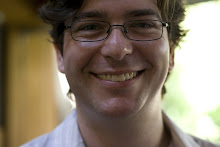Like a Friend Expected/Sonic Tonic
27/10/07
Grañon, Spain
It's cold now. Starting to move into the 'properly cold' territory. The next few days walk will take me higher and closer to the open, cold meseta - the giant plateau of central northern Spain. While at only around 800m, the lack of nearby ocean and the vast openness of the land means that bitter cold is likely to be my companion for the next two weeks.
The refugio I am in tonight is simply beautiful in a staying-in-the-bell-tower-of-the-church rustic kind of way - everything done with an old school ascetic functionality in mind; mattresses on floors, open fire, long wooden dining table. Gryffindor Tower comes to mind, too, especially because of the immediately close friendship offered. So, it's also beautiful because of the warmth of the welcome I received when I arrived. The French hospitalero couple looking after this place greeted me with smiles and comfort as if I were a friend expected. I find myself reminded of Athos, in Greece - that same Christian welcome and sense of ascetic homeliness. I'm touched by it, by the simple humanity of it.
As I write the husband, who is cooking tonight, is quizzing his wife on what spices he needs to add to the soup. In front of me a small fire crackles quietly in the large fireplace, somehow throwing plenty of heat into the room (along with a fair bit of smoke). In the background a CD of Gregorian chants plays, and its haunting chords and melodies feel right at home here. It is a music that speaks of ascetic life of long cold winters and purpose.
This is very much a journey of simplicity - forced and desired. Needs are simple: bed, food, water, warmth, Way markers. In the context of looking after these immediate needs the plethora of superfluous, vain, or simply bored ones drops away. The experience is both liberating and enlightening. The 'stuff' one tends to imagine one needs for life loses much of its provenance and begins to float untethered in the mind, eventually drifting off into the distance. The demonstrated, experienced simplicity of life gives one hope; "You know, I think I really can be happy. It doesn't actually take that much... And all this time I thought I couldn't... Huh." Freed of the mundane (which I actually suspect is the stuff we often don't need, largely) the mind turns both inward and outward. Important questions, sometimes long neglected, come into undistracted focus, and the small beauties of the physical world are regarded.
Likewise, one's fellow pilgrim becomes of great concern - their health, their happiness (here and at home). It is a care that somehow many of the hospitaleros share. I don't know how they do it, day after day, new face after new face. It is a life of service (although most are volunteers for a few weeks at a time only). Like many who give their time to others, the couple here told me they draw great joy, a deep personal joy, from their time of service here, despite the stress it sometimes brings. But I think it also is a life of purpose, driven by the simple needs of fellow pilgrims, fellow human beings; warmth of house and welcome for weary beings, food and water for hungry bellies, and bedding for tired bodies. But somewhere in the dynamic of care there there arises something that nourishes both fed and feeder. Reduced to such simple needs acts of kindness uncalled for or friendship unearned glow like fire, and it is clear that the unadorned light falls on both.
It seems as though the act of care is as important for the carer as for their often anonymous charge.
29/10/07
Burgos, Spain
Today I took 80,000 steps. At the end there was music, laughter, dancing, and singing. Inhibitions often seem temporarily vanquished as the sun goes down each day, by weariness, by friendship. Now there is silence, like that between songs, as the pilgrims make their daily chores - bathing, washing, tending to feet. Some write in diaries, some in emails, but now the music is over people go about it refreshed. The songs were like tonics, and we drank them, all.
More: Full post
